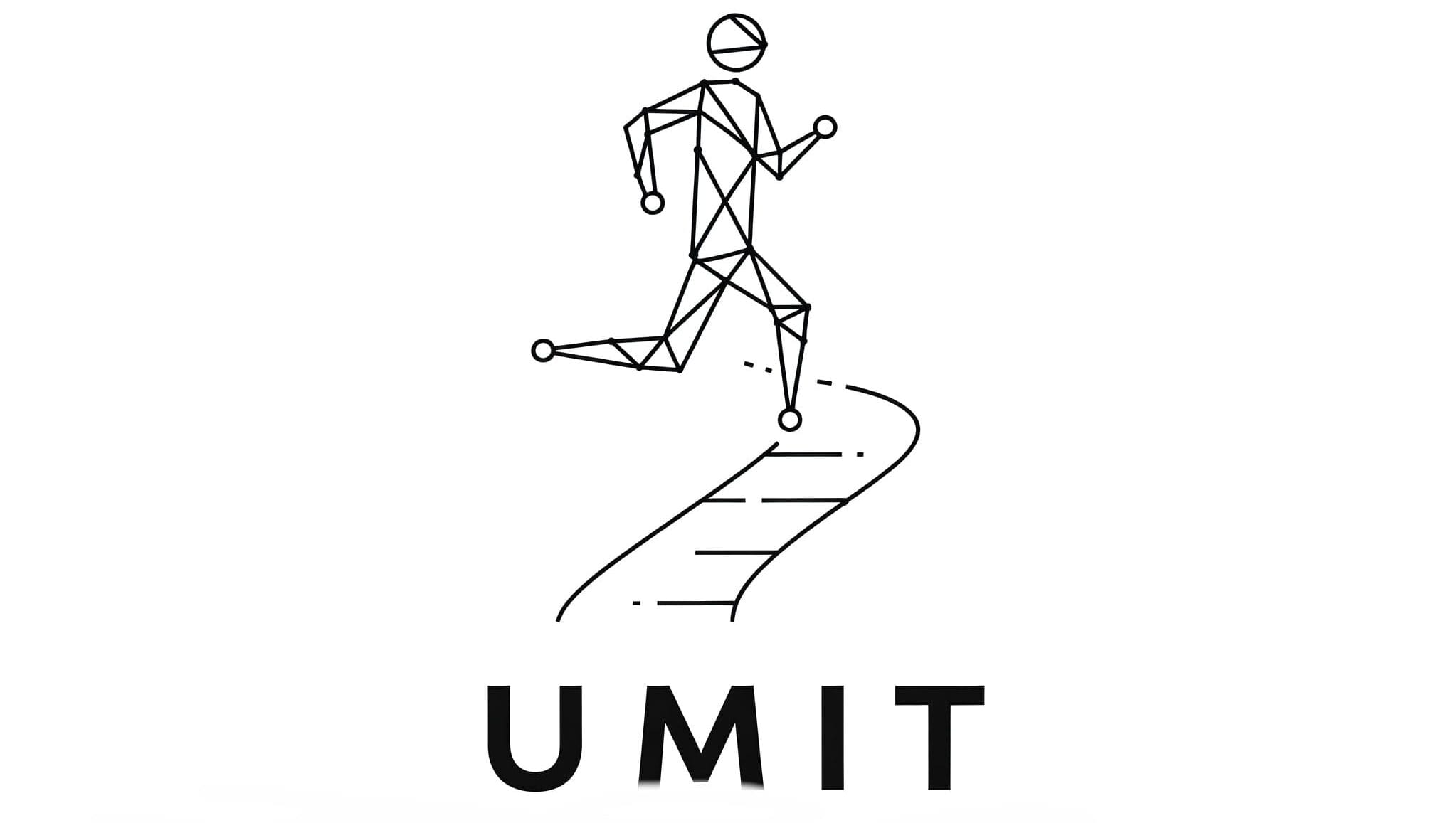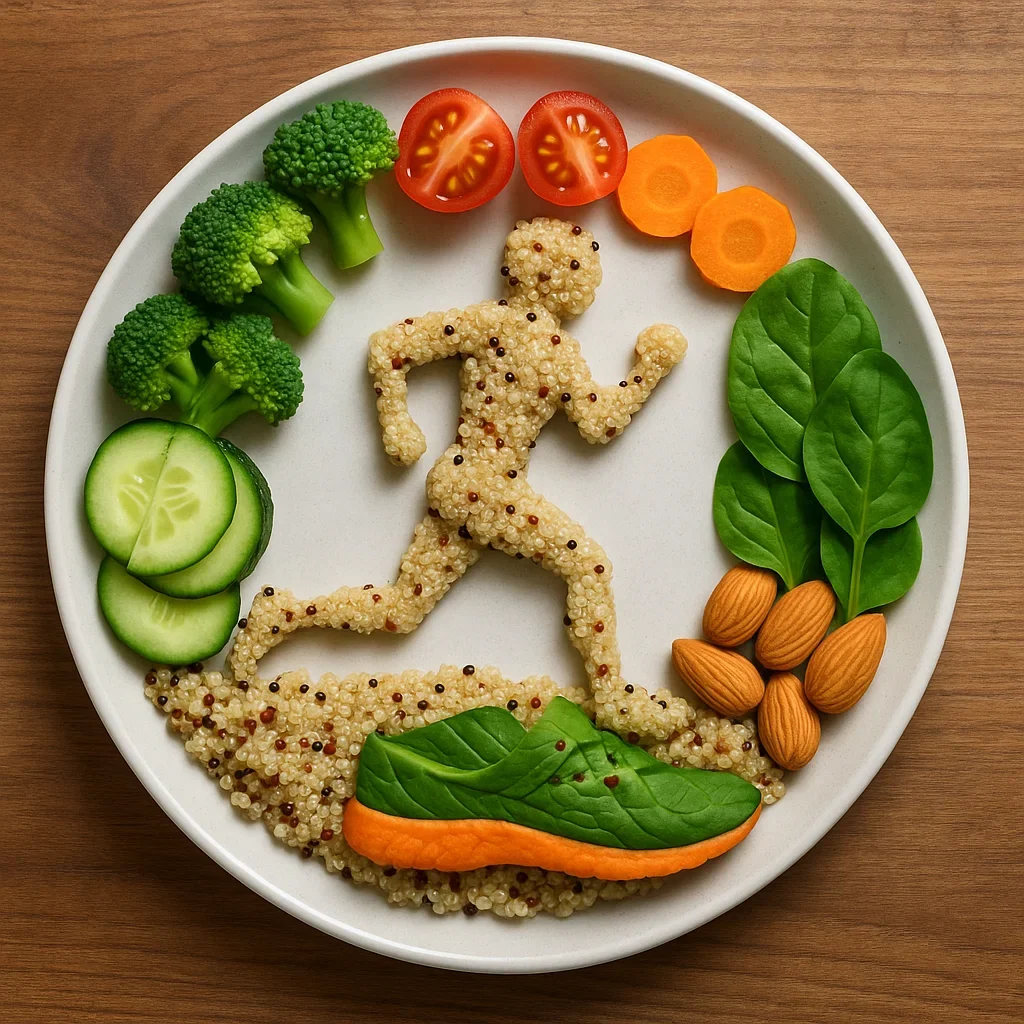🌱 Can Ultra Runners Thrive on a Plant-Based Diet?
In a sport that demands peak endurance, rapid recovery, and relentless fueling, the question naturally arises: Can ultra runners truly thrive on a plant-based diet? The answer — backed by science and trail-tested by champions — is a resounding yes, with the right approach. 🏃♀️🥬
Elite athletes like Scott Jurek, author of Eat & Run, have shown the world that you don’t need meat, eggs, or dairy to conquer 100 miles. In fact, many runners report better digestion, faster recovery, and reduced inflammation when switching to a vegan or vegetarian approach.
But that doesn’t mean it’s easy or without pitfalls. Ultra runners burn thousands of calories and push their bodies to the edge — and plant-based fueling requires thoughtful strategy to keep up. This guide breaks down the essentials so you can fuel ultras with plants and recover strong.
🥜 Part 1: Caloric & Protein Needs for Vegan Ultra Runners
One of the biggest myths about vegan diets is that they can’t provide enough calories or protein for endurance athletes. In reality, you can absolutely hit your macros on a plant-based diet — but it takes planning and consistency. Here’s how to get it right:
🔥 Energy Needs: Calorie Density Is Key
Plant-based diets are naturally high in volume but lower in calorie density compared to animal-based diets. That means you’ll need to eat more food — and more often — to meet your ultramarathon demands.
Calorie Boosting Tips:
- Add nut butters, avocados, olive oil, coconut milk, and dried fruits to meals.
- Incorporate smoothies with protein powder, oats, bananas, and flaxseeds as snacks.
- Don’t fear healthy fats — they’re critical for ultra endurance and long efforts.
💡 Example: One tablespoon of peanut butter = ~100 kcal. Add 2 tbsp to oatmeal, and you’ve just doubled its fuel value.
💪 Where’s the Protein? Right Here:
You don’t need chicken or whey to build muscle or support long miles. Vegan protein sources can easily cover your needs if you mix them wisely.
Top Vegan Protein Sources for Ultra Runners:
| Food | Serving | Protein |
|---|---|---|
| Lentils (cooked) | 1 cup | 18g |
| Tempeh | 100g | 20g |
| Tofu (firm) | 1/2 block | 19g |
| Chickpeas | 1 cup | 15g |
| Hemp seeds | 3 tbsp | 10g |
| Peanut butter | 2 tbsp | 8g |
| Black beans | 1 cup | 15g |
| Quinoa (cooked) | 1 cup | 8g |
| Soy yogurt (unsweetened) | 150g | 6-8g |
🧠 Pro Tip: Combine legumes + grains (e.g., lentils + rice, beans + tortillas) for complete amino acid profiles.
📋 Sample Daily Macronutrient Plan (Training Day – 70kg runner)
| Meal | Foods | Calories | Protein |
|---|---|---|---|
| Breakfast | Oats + almond milk, banana, peanut butter, chia seeds | 600 | 18g |
| Snack | Smoothie (plant protein powder, berries, oats, flax) | 500 | 25g |
| Lunch | Quinoa salad with tofu, hummus, mixed greens, olive oil | 700 | 30g |
| Snack | Trail mix + dried mango | 400 | 10g |
| Dinner | Brown rice, tempeh stir-fry, avocado, tahini dressing | 800 | 35g |
| Total | – | ~3000 kcal | ~120g protein |
💬 Motivation Box:
“I ran my fastest 100-miler after going vegan. My recovery got better, and my gut thanked me!”
— Anonymous trail runner, UTMB finisher
🥗 Part 2: Day-to-Day Training Diet for Plant-Based Ultra Runners
Training for an ultramarathon means you’re fueling the engine every single day — not just during the race. For plant-based runners, the goal is to build a nutrition routine that’s:
✅ Calorie-rich
✅ Balanced in macronutrients
✅ Easy to digest
✅ Packed with micronutrients
Let’s break down what a typical day of eating might look like for a vegan ultra runner.
🌄 Morning Routine: Breakfast That Fuels Long Runs
Goal: Slow-burning carbs + protein + fat to support endurance and stabilize blood sugar.
Example Breakfasts:
- Oatmeal Bowl: Rolled oats, almond milk, banana, flaxseeds, peanut butter, and a sprinkle of cinnamon.
- Tofu Scramble Wrap: Crumbled tofu with turmeric, spinach, bell peppers, wrapped in a whole grain tortilla.
- Smoothie Bowl: Frozen berries, oats, plant-based protein powder, almond butter, and granola topping.
🧠 Optional Add-Ons: Add coffee with oat milk and a vitamin B12 spray to support energy metabolism.
🏃♂️ Pre-Workout & Midday Fueling
If you’re doing a morning long run, quick carbs are your best friend.
Pre-Run Snack Ideas (30–60 mins before):
- Dates stuffed with peanut butter
- Banana + a pinch of sea salt
- Rice cake with jam
- Homemade oat energy ball
After the run, it’s time to refuel with protein + carbs for recovery and glycogen restoration.
Post-Run Lunch Examples:
- Buddha Bowl: Brown rice, black beans, avocado, roasted sweet potatoes, tahini drizzle.
- Chickpea Salad Sandwich: Mashed chickpeas, tahini, mustard, celery, whole-grain bread.
- Lentil Pasta Bowl: Red lentil pasta, spinach, tomato sauce, nutritional yeast for B12 and umami flavor.
📌 Don’t forget hydration with electrolytes! Coconut water + pinch of sea salt is a natural recovery drink.
🌆 Evening Refuel: Recovery & Prep for Tomorrow
Dinner for a vegan ultra runner should support muscle recovery, gut health, and sleep.
Dinner Options:
- Tofu Stir-Fry: With mixed veggies, soba noodles, sesame oil, and ginger.
- Vegan Chili: Kidney beans, lentils, corn, tomato, topped with avocado and served with whole grain bread.
- Stuffed Sweet Potato: Baked sweet potato with black beans, sautéed kale, nutritional yeast, and cashew cream.
🌙 Evening Tip: A small mug of tart cherry juice or turmeric golden milk may help reduce inflammation and improve sleep.
🔁 Snacks & Add-ons Throughout the Day
Vegan runners often eat more frequently to meet their energy demands.
Snack Ideas:
- Trail mix with almonds, dried fruit, and dark chocolate
- Roasted chickpeas or edamame
- Plant-based protein bar (check for vegan label!)
- Hummus with whole grain crackers or veggie sticks
- Vegan yogurt with granola
⚖️ Tip: Aim for 3–4g of carbs per kg body weight, and 1.5–2g protein per kg to support training adaptation.
🧠 Quick Checklist: Daily Essentials for Vegan Ultra Runners
- At least 4 servings of whole grains
- 3+ servings of legumes or soy-based foods
- 2 servings of healthy fats (nuts, seeds, avocado)
- Greens or cruciferous veggies every day
- Supplement or fortified source of B12
💬 Motivation Box:
“My biggest gains came not from mileage, but from consistency in how I fueled. Vegan food gave me energy without dragging me down.”
— Vegan runner, 100K finisher
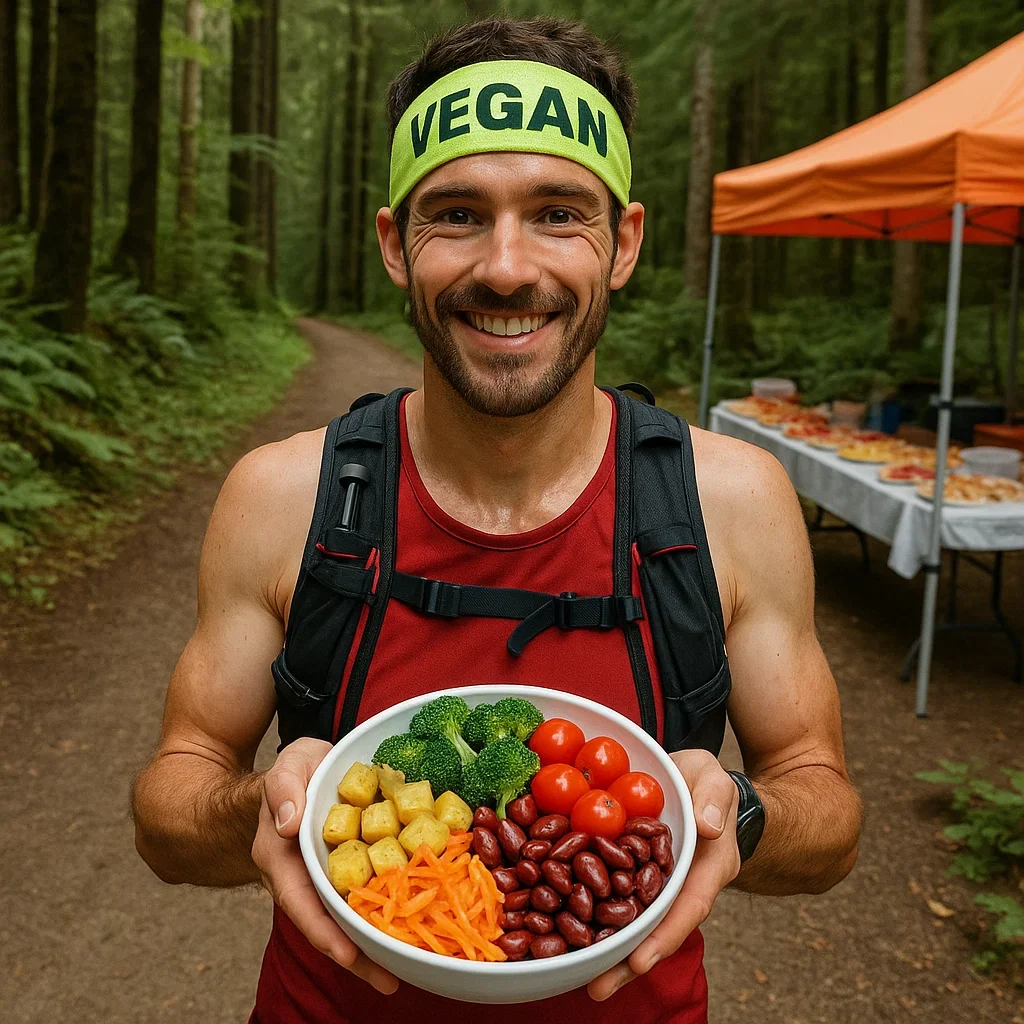
🔥 Haydi boss, şimdi de yarışın tam içindeyiz: In-Race Fueling Considerations for Vegan Ultra Runners. Bu bölümde aid station’larda ne yenir, hangi ürünler vegan, ve potansiyel tuzaklar nedir hepsine dalıyoruz! 🏁
🏃♀️ Part 3: In-Race Fueling Considerations (Vegan Edition)
Fueling properly during an ultramarathon is non-negotiable. For plant-based runners, the good news is: most modern race fuels are already vegan — but you still need to plan ahead.
⚡ Common Vegan Race Fuels (Pack & Go!)
Many popular endurance products are either intentionally vegan or happen to be plant-based by default.
Top Vegan Fueling Products:
| Product | Type | Notes |
|---|---|---|
| Tailwind Nutrition | Drink mix | All flavors are vegan-friendly 💧 |
| Clif Gels & Bloks | Gels/Chews | Entire line is vegan ✅ |
| GU Roctane (select) | Gels | Check label — some flavors contain dairy ❗ |
| Huma Chia Gels | Gel | Made with fruit purée and chia seeds 🌱 |
| Spring Energy (some) | Gel | Not all are vegan — read ingredients carefully |
| UnTapped Maple Syrup | Liquid fuel | 100% natural maple energy shot 🍁 |
🎒 Pack your own trusted fuels when possible to avoid last-minute surprises.
🧀 Aid Station Alert: What to Watch Out For
Many traditional ultra aid stations are filled with energy-rich but non-vegan foods, especially later in the race.
Potential Pitfalls:
- Cheese quesadillas
- Broth-based soups (usually made with chicken/beef stock)
- Milk chocolate
- Gummy candies (contain gelatin)
- Sandwiches with butter or dairy-based spreads
Instead, keep your eyes open for naturally plant-based or customizable options.
Vegan-Friendly Aid Station Finds:
| Food | Tip |
|---|---|
| PB&J sandwiches | Confirm bread is dairy/egg-free (often is) |
| Fruit | Bananas, oranges, watermelon = perfect quick carbs |
| Potatoes | If plain or dipped in salt, they’re race gold 🥔 |
| Pickles | Great for sodium and stomach reset |
| Pretzels / Crackers | Check ingredients or ask volunteers |
| Nut butters | Often found in squeeze packs |
💡 Bring your own wraps or snacks to supplement in case options are limited.
🍬 DIY Vegan Fuel Ideas (If You Prefer Homemade)
Some runners opt for homemade fueling to ensure full control over ingredients.
Vegan DIY Fuel Ideas:
- Date + almond butter balls
- Homemade energy bars with oats, nut butter, chia, syrup
- Maple syrup shots in mini squeeze pouches
- Mashed sweet potato + sea salt in reusable baby food pouch
💬 Pro Tip: Test all fuel types in training — not just physical digestion, but mental satisfaction (aka flavor fatigue).
💧 Electrolytes & Hydration
Most electrolyte powders and tabs are vegan — but again, always verify.
Popular Vegan Electrolyte Brands:
- Nuun Sport (plant-based)
- Skratch Labs Hydration Mix
- SaltStick FastChews (select)
- LMNT (all flavors vegan)
⚠️ Some electrolyte capsules contain gelatin in their casing. Stick to powders, tabs, or vegan-certified versions.
🧠 Quick FAQ: Vegan Ultra Fueling Edition
Q: What do I do if there’s nothing vegan at the aid station?
A: Always carry 1–2 backup options in your vest. Energy bars, dried fruit, or a squeeze pouch can save the day.
Q: Can I use whole foods like nuts or trail mix during the race?
A: Yes — but test in training. High-fat foods digest slower and may not sit well mid-race.
Q: Are caffeine gels vegan?
A: Most are! Clif, Tailwind, and Huma all offer caffeinated vegan options.
💬 Motivation Box:
“I used to struggle with gut issues during races. Once I went plant-based, my fueling became cleaner and smoother.”
— 50-mile vegan runner, age 42
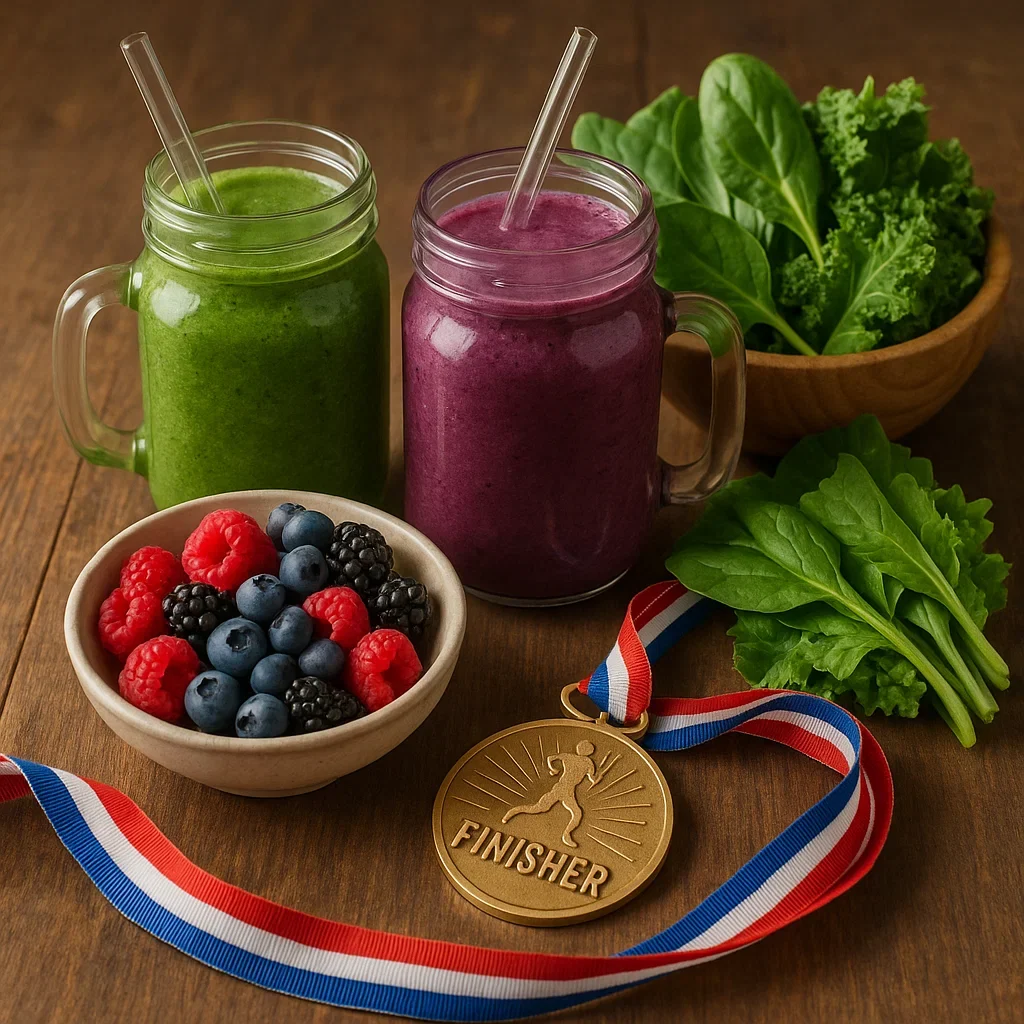
💊 Part 4: Nutrients to Watch on a Vegan Ultramarathon Diet
Eating plant-based can provide plenty of energy, antioxidants, and fiber — but there are a few nutrients that require special attention to avoid fatigue, injury risk, or underperformance.
Here’s a breakdown of what vegan ultra runners should track, why it matters, and how to stay dialed in.
🧬 Vitamin B12 – The Non-Negotiable One
Why it matters: B12 supports red blood cell formation, nerve function, and energy metabolism. A deficiency can lead to anemia, fatigue, and neurological issues.
Plant sources? None.
Fix: Supplement. Always. Either a daily low-dose (25–100 mcg) or weekly high-dose (1000–2000 mcg) cyanocobalamin or methylcobalamin.
💊 Runner Tip: Sublingual sprays or dissolvable tabs are well absorbed — use with breakfast.
🩸 Iron – Endurance Engine Fuel
Why it matters: Iron helps transport oxygen via hemoglobin. Low iron = low oxygen = poor performance.
Risk factors:
- Women (especially premenopausal)
- High mileage athletes
- Diets low in iron-rich plants or lacking absorption aids
Top Vegan Iron Sources:
| Food | Serving | Iron (mg) |
|---|---|---|
| Lentils (cooked) | 1 cup | 6.6 |
| Spinach (cooked) | 1 cup | 6.4 |
| Tofu (firm) | 1/2 block | 3.4 |
| Pumpkin seeds | 1 oz | 2.7 |
| Quinoa | 1 cup | 2.8 |
| Blackstrap molasses | 1 tbsp | 3.5 |
📌 Boost absorption with vitamin C: Add bell peppers, citrus, or strawberries to meals.
⚠️ Avoid drinking coffee or tea with meals — tannins reduce iron absorption.
🔬 Pro Tip: Get your ferritin checked regularly if training hard. Supplement only if low and under guidance.
🧂 Zinc – Immunity & Recovery
Why it matters: Zinc is key for immune function, wound healing, and maintaining testosterone levels.
Risk: Phytates in grains and legumes can inhibit absorption.
Sources: Pumpkin seeds, tofu, oats, lentils, cashews, nutritional yeast
🧠 Boost tip: Soaking or sprouting legumes/grains can improve zinc bioavailability. If needed, use a low-dose zinc supplement (10–15mg).
🌊 Omega-3s – Anti-Inflammation Ally
Why it matters: EPA and DHA support brain health, joint recovery, and inflammation control.
Plant Sources (ALA form):
- Chia seeds
- Flaxseeds
- Walnuts
- Hemp seeds
But ALA → EPA/DHA conversion is poor.
🧠 Fix: Use an algae-based omega-3 supplement with 250–500mg EPA/DHA daily.
☀️ Vitamin D – The Sunshine Vitamin
Why it matters: Supports bone health, immune system, and mood. Deficiency = stress fractures, fatigue, slow recovery.
Source: Sun exposure (but limited if indoors or winter)
Fix: Supplement with 1000–2000 IU daily, or more if deficient.
☀️ Pro Tip: Pair with magnesium and K2 for bone health synergy.
🧪 Other Micronutrients to Monitor:
| Nutrient | Role | Notes |
|---|---|---|
| Calcium | Bone strength | Fortified plant milks, sesame, leafy greens |
| Iodine | Thyroid health | Use iodized salt or seaweed (carefully) |
| Selenium | Antioxidant | 1–2 Brazil nuts/day = sufficient |
| Choline | Brain & liver | Found in soy, quinoa, mushrooms |
🧠 Runner’s Routine: Smart Supplement Stack (Example)
- Morning: B12 spray, multivitamin (with iron), D3+K2
- Evening: Algae Omega-3, magnesium glycinate, zinc (if needed)
📋 Always test, never guess — get bloodwork at least 1–2x/year during training blocks.
💬 Motivation Box:
“I struggled with fatigue for months before I realized my iron and B12 were low. Now I check regularly, and I’m stronger than ever.”
— Vegan runner, 100-mile finisher
🌿 Part 5: Recovery on a Plant-Based Diet – The Anti-Inflammatory Advantage
Plant-based runners often experience faster recovery, less muscle soreness, and reduced inflammation — but only when their diet is intentional and complete.
Let’s dive into how you can bounce back stronger using the power of plants. 🔁
🔥 Why Plants Speed Up Recovery
Vegan diets are naturally rich in phytonutrients, fiber, and anti-inflammatory compounds, which:
- Reduce oxidative stress
- Support gut microbiome (crucial for nutrient absorption)
- Lower post-exercise inflammation
- Accelerate muscle repair
💬 Translation? Less downtime. More trail time.
🧪 Top Anti-Inflammatory Foods for Recovery
| Food | What It Does |
|---|---|
| Tart cherry juice | Reduces DOMS (delayed soreness), improves sleep 💤 |
| Turmeric (with black pepper) | Potent anti-inflammatory — natural ibuprofen |
| Dark leafy greens | High in magnesium, calcium, iron, and antioxidants |
| Berries (blueberries, strawberries) | Neutralize free radicals from training |
| Flax & chia seeds | Omega-3 ALA, fiber, and anti-inflammatory fats |
| Beets | Boost nitric oxide → blood flow → muscle oxygenation |
| Avocados & olive oil | Healthy fats, reduce joint stiffness |
| Fermented foods (tempeh, kimchi, sauerkraut) | Gut health = nutrient absorption = better recovery |
🥣 Sample Vegan Post-Race Recovery Meal Plan (24–48 Hours After)
🕒 Immediately After Finish (within 30 min)
- Smoothie: Banana + berries + vegan protein powder + almond milk + flax
- Tart cherry juice shot
🍽️ Dinner Post-Race
- Lentil & quinoa stew with turmeric and kale
- Sweet potato mash with olive oil
- Kimchi or sauerkraut on the side
- Dark chocolate square with magnesium-rich pumpkin seeds
🍳 Next Morning Breakfast
- Tofu scramble with spinach and mushrooms
- Oatmeal with chia, banana, almond butter
- Coffee with fortified soy milk (for B12 and calcium)
💧 Throughout the Day:
- Rehydrate with coconut water + pinch of salt
- Herbal teas with ginger or peppermint to calm digestion
📉 What to Avoid During Recovery (Even If It’s Tempting)
- ❌ Sugary sports drinks with artificial colors
- ❌ Heavy fried foods (pro-inflammatory)
- ❌ Dairy (for vegans — can cause bloating/inflammation in some)
- ❌ Alcohol (impairs muscle repair, sleep, hydration)
🎯 Focus instead on clean, colorful, whole-food meals.
🧠 Mental Recovery on a Plant-Based Diet
Post-race mood dips are real. The gut-brain axis plays a role, and plant-rich, high-fiber diets support a healthy microbiome — which impacts mood, motivation, and immunity.
🧘 Pro Tip: Include fermented foods daily for both gut healing and mental clarity.
💬 Motivation Box:
“I used to feel wrecked for days after long races. Now with plant-based recovery — tart cherry, turmeric, greens — I bounce back in half the time.”
— Vegan runner, age 50, 100K finisher
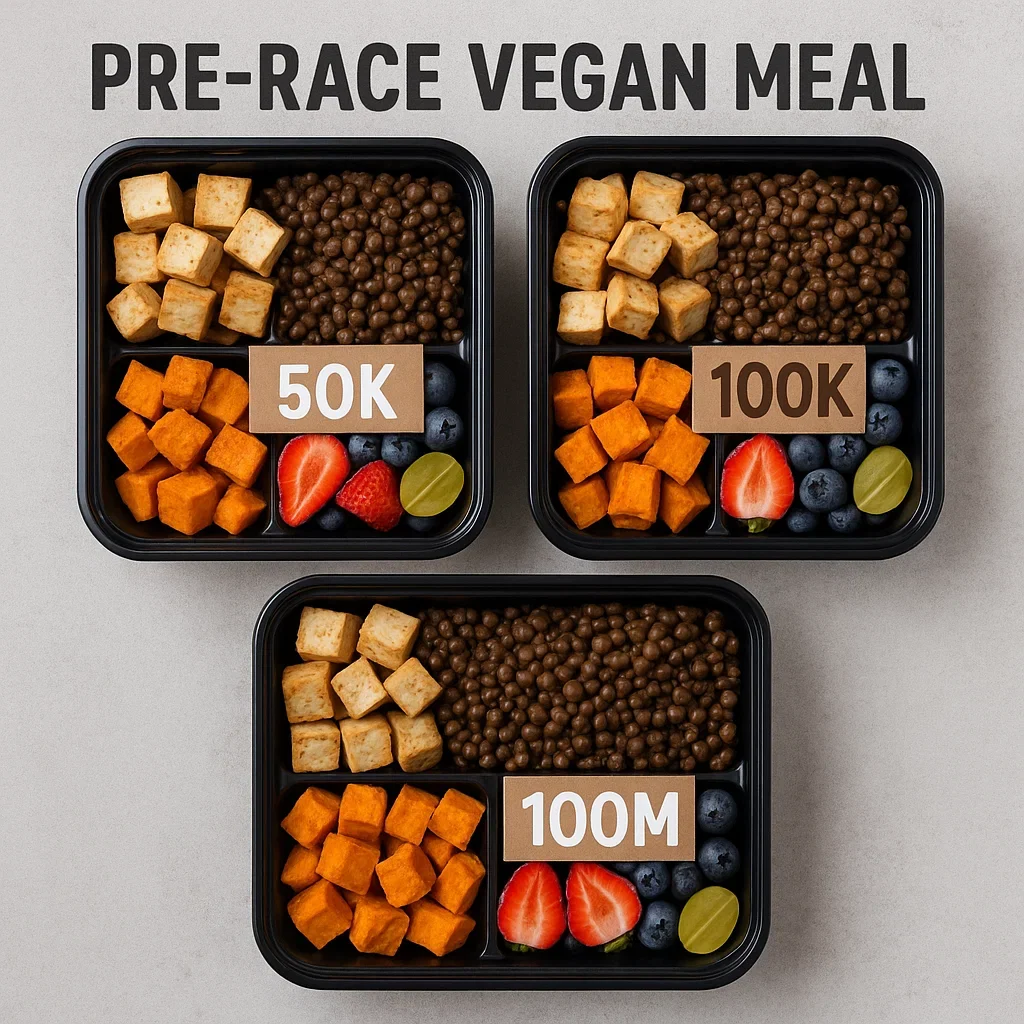
🧘 Final Word: Thriving on Plants — For Every Runner
Fueling an ultramarathon on a plant-based diet isn’t just possible — it’s powerful. With the right planning, attention to nutrients, and smart fueling strategies, vegan and vegetarian ultra runners can not only survive 50, 100, or even 200 miles — they can thrive.
But here’s the truth:
🌱 You don’t have to be fully vegan to benefit from plant-based strategies.
Even omnivorous runners can:
- Improve recovery by adding more anti-inflammatory meals
- Use plant-based fuels for stomach-friendly long runs
- Experiment with meatless days for gut health and variety
- Supplement with vegan-friendly nutrients like tart cherry, magnesium, or algae-based omega-3
The endurance world is evolving — and plant-powered athletes are showing what’s possible. From Scott Jurek to a growing army of everyday trail runners, the results speak for themselves.
🏁 Whether you’re a curious omnivore, dedicated vegan, or plant-leaning adventurer — you belong here.
And with smart choices, you’ll go farther than ever. 🌄💚
📚 Further Reading – Expand Your Plant-Powered Ultra Wisdom
-
🥪 Ultramarathon Nutrition & Hydration Strategy: Fuel and Hydrate for Endurance Success
Comprehensive guide to ultra fueling strategies, adaptable for plant-based runners too. -
💪 The Ultimate Guide to Recovery After a 100-Mile Race
Explore plant-forward recovery meals, sleep tools, and mental reset strategies. -
🏔️ Low Mileage Ultra Marathon Training Plan for Beginners
Enhance your vegan-fueled performance with strength, mobility, and injury prevention tactics. -
🔬 Master Your Ultra Nutrition Strategy: Fuel Your First 50k/100 Miler
Peer-reviewed research on how vegan diets influence VO2max, recovery, and long-term energy systems. -
🥗 Ultramarathon Running Guide: Training, Gear, Nutrition & Mental Preparation
A practical breakdown from one of the most trusted endurance outlets.
-
📊 NCBI – Plant-Based Diets and Endurance Performance
Peer-reviewed article analyzing vegan and vegetarian diets in long-distance athletes. -
🏃♂️ Runner’s World – How to Fuel Your Run on a Plant-Based Diet
Accessible advice from one of the most established endurance running publications. -
🥬 NutritionFacts.org – What About Vegan Athletes?
Dr. Michael Greger on performance data and recovery in plant-powered athletes. -
🎓 PubMed – Effects of Vegan Diets on Performance Metrics
Scientific review examining VO2 max, muscle damage, and inflammation markers in vegan vs. omnivorous athletes.
❓ Frequently Asked Questions – Vegan Ultrarunning Explained
🥗 Can I get enough protein on a vegan diet as an ultrarunner?
Yes, with smart planning. Lentils, tofu, tempeh, legumes, nuts, seeds, and vegan protein powders are excellent sources. Aim for 1.5–2g protein per kg of bodyweight.
🧬 Do I need to take a B12 supplement?
Absolutely. B12 is not found in plant foods and must be supplemented. Daily or weekly doses are both effective depending on form.
🥄 What are some vegan-friendly in-race fuel options?
Clif Gels, Tailwind, Huma, dates with nut butter, maple syrup packs, and many fruits are excellent. Always check labels for animal-based ingredients.
🥔 What can I eat at aid stations during a race?
PB&J sandwiches (with vegan bread), salted potatoes, fruits, pretzels, pickles, and sometimes vegan broth or hummus. Pack a backup snack in case options are limited.
🧘 Is recovery slower without animal protein?
No, not if you meet your macro and micro needs. Plants provide anti-inflammatory nutrients that can even enhance recovery when combined with enough calories and protein.
⚡ What supplements should vegan runners consider?
B12, iron (if low), vitamin D, omega-3 (algae-based), zinc, and possibly creatine or taurine. Get blood tests to personalize your needs.
🍫 Are most energy bars vegan?
Many are, but some include dairy, honey, or whey. Always read labels. Brands like GoMacro, Clif, and Larabar offer vegan lines.
💧 Are electrolyte tabs and drink mixes vegan?
Most are plant-friendly, including Nuun, Skratch, Tailwind, and LMNT. Watch for gelatin capsules in some salt pills.
🥬 Can I get enough iron from plants?
Yes — lentils, tofu, spinach, pumpkin seeds, quinoa, and blackstrap molasses are excellent. Combine with vitamin C for better absorption.
🍽️ What’s a sample full-day vegan ultrarunner meal plan?
Oats + fruit + seeds for breakfast, smoothie with protein midday, quinoa bowl with tofu for lunch, snacks like trail mix or hummus, and a stir-fry or chili for dinner.
🔥 Can vegan diets reduce inflammation?
Yes. Plants like berries, turmeric, leafy greens, and chia seeds are high in antioxidants and natural anti-inflammatory compounds.
🏔️ Do vegan runners struggle more with energy levels?
Only if calorie intake or nutrient balance is off. A well-planned vegan diet can support peak energy and endurance.
🥜 What are the best vegan snacks for long runs?
Dates, nut butter, rice cakes, energy balls, dried fruit, and vegan gels or chews like Clif Bloks or Spring Energy (check flavors).
🧠 Does a vegan diet help with mental clarity during ultras?
Many runners report fewer GI issues and more stable energy. Gut-friendly foods and good hydration support better mental performance.
🧂 How do I manage sodium and electrolyte balance?
Use electrolyte tabs/powders, eat salted foods like pickles or potatoes, and don’t fear sodium — it’s essential in ultras.
🏕️ Should I bring my own food for races?
Yes, especially if you’re strict vegan. Not all aid stations label ingredients clearly. Bring a few key items you trust.
🧃 Can I use smoothies as a recovery option?
Absolutely. A good recovery smoothie includes protein (plant powder or soy milk), fruit, greens, and healthy fats like flax or almond butter.
📉 How do I know if I’m under-fueling?
Warning signs include fatigue, irritability, poor recovery, frequent illness, or mood swings. Track food, sleep, and energy levels regularly.
🎯 What’s the biggest mistake vegan runners make?
Not eating enough total calories, neglecting B12 and iron, and failing to plan in-race fuel. Preparation beats motivation.
🌎 Do I need to be 100% vegan to benefit?
No. Even partially plant-based runners can improve recovery, reduce inflammation, and explore sustainable performance nutrition.
🧠 Quiz: Can You Fuel an Ultramarathon on Plants?
❓ Questions
1️⃣ Which vitamin is essential for vegan runners and not found in plant foods?
A) Vitamin C
B) Iron
C) Vitamin B12
D) Omega-3
2️⃣ Which of these is a complete vegan protein source?
A) Tofu
B) Rice
C) Chickpeas
D) Peanut butter
3️⃣ What plant-based food helps reduce muscle soreness post-race?
A) Apples
B) Tart cherry juice
C) Cucumbers
D) Almond milk
4️⃣ Which nutrient helps improve oxygen transport in endurance efforts?
A) Zinc
B) Calcium
C) Iron
D) Magnesium
5️⃣ Which gel brand offers vegan options suitable for ultras?
A) GU (all flavors)
B) Clif
C) PowerGel
D) Maurten (all flavors)
6️⃣ What’s the best time to consume protein after a hard run?
A) 2–3 hours later
B) Immediately, within 30–60 min
C) Next day at breakfast
D) Timing doesn’t matter
7️⃣ Which seed is highest in plant-based omega-3s (ALA)?
A) Sunflower
B) Pumpkin
C) Flax
D) Sesame
8️⃣ Which is the most reliable source of iodine on a vegan diet?
A) Chia seeds
B) Iodized salt
C) Nutritional yeast
D) Cashews
9️⃣ What’s one sign you may be under-fueling as a vegan runner?
A) Better sleep
B) Decreased appetite
C) Constant energy
D) Mood swings or fatigue
🔟 Which recovery meal combo is most balanced post-ultra?
A) Salad + fruit juice
B) Protein bar + water
C) Quinoa + tofu + sweet potato
D) Pasta with tomato sauce only
✅ Answers
1️⃣ C) Vitamin B12
👉 B12 must be supplemented by all vegans for nerve health and red blood cell production.
2️⃣ A) Tofu
👉 Tofu (soy-based) contains all 9 essential amino acids, making it a complete protein.
3️⃣ B) Tart cherry juice
👉 Proven to reduce muscle soreness and inflammation after endurance efforts.
4️⃣ C) Iron
👉 Iron is key for hemoglobin production and oxygen delivery in endurance athletes.
5️⃣ B) Clif
👉 All Clif products are labeled vegan and widely trusted by ultra athletes.
6️⃣ B) Immediately, within 30–60 min
👉 That window is optimal for muscle repair and glycogen replenishment.
7️⃣ C) Flax
👉 Flaxseeds are rich in alpha-linolenic acid (ALA), the plant-based omega-3.
8️⃣ B) Iodized salt
👉 It’s a consistent and controllable source of iodine for thyroid health.
9️⃣ D) Mood swings or fatigue
👉 These are common signs of low energy intake or nutrient deficiencies.
🔟 C) Quinoa + tofu + sweet potato
👉 Combines protein, complex carbs, and micronutrients in a race-ready recovery plate.
🔗 Plant-Based Ultra Runner Essentials PDF

About the Author
Lost Pace is an ultramarathon runner, shoe-tester and the founder of umit.net. Based year-round in Türkiye’s rugged Kaçkar Mountains, he has logged 10,000 + km of technical trail running and completed multiple 50 K–100 K ultras.
Blending mountain grit with data, Lost analyses power (CP 300 W), HRV and nutrition to craft evidence-backed training plans. He has co-written 260 + long-form guides on footwear science, recovery and endurance nutrition, and is a regular beta-tester of AI-driven coaching tools.
When he isn’t chasing PRs or testing midsoles, you’ll find him sharing peer-reviewed research in plain English to help runners train smarter, stay healthier and finish stronger.
Ultrarunner · Data geek · Vegan athlete
